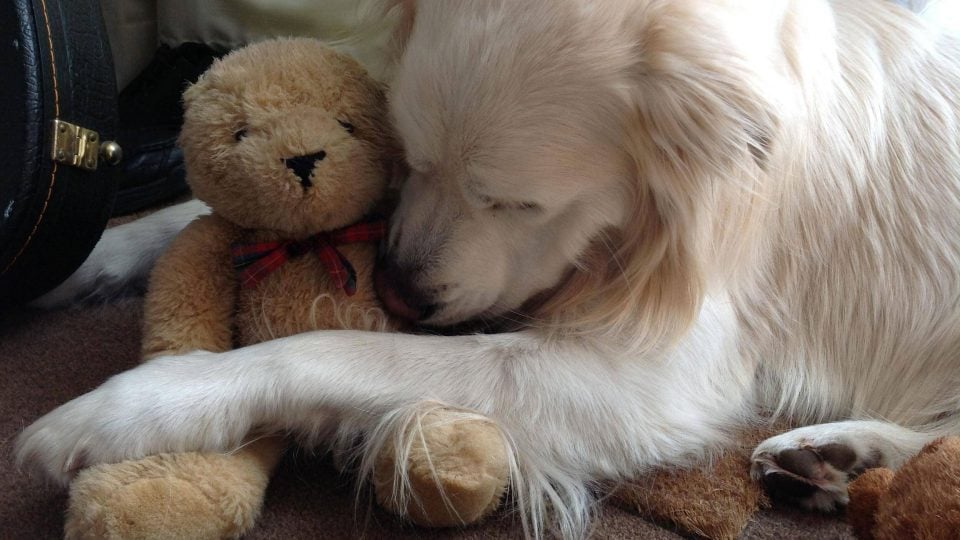When she was about one year old, my dog Ralph the Girl started barking at strange men in the street. She’d never had a problem with men in the past—in fact, my dad and brothers were her favorite people on earth!—but suddenly, she was skittish around them, especially men wearing hats.
I didn’t know it at the time, but Ralph was going through her adolescent fear period.
Between birth and 18 months, dogs go through two distinct fear periods. During these times, puppies may show fear of situations, items, or people with whom they formerly felt safe.
Fear periods are temporary, but if handled incorrectly, they can lead to lasting fears over time. Read on to learn how to help your puppy make it through her fear periods unscathed.
Puppy fear period (age 8-12 weeks)
When puppies are between eight to twelve weeks old, they enter the “fear impact period,” in which they learn to differentiate between safety and danger. Perhaps your puppy is barking at the couch, or acting shy around new people. That’s because she’s learning to make sense of the world around her, and every object or person must be evaluated anew.
In the wild, dogs this age take “field trips” with their mom, play-fighting and play-hunting to learn the difference between safe and threatening items in their environment. These formative experiences help develop their fight-or-flight instincts, and help them survive as they mature.
Of course, your puppy is not fighting for survival in the wild. But her experiences—both positive and negative—stick with her for life. During the formative puppy fear period, provide positive social experiences to build your dog’s confidence:
- Avoid new or frightening environments
- Encourage supervised socialization with other dogs and people
- Always use positive reinforcement to praise and reward your puppy
- Remain calm! Your puppy mirrors your reactions. If you act anxious and jumpy in new situations, they will do the same. Project calm confidence to show your puppy that the world is not a scary place.
For more puppy-training and socialization tips, click here.
Adolescent fear period (age 6-14 months)
If your adolescent dog is afraid of men after being fine with them up until now, it’s possible she’s entering her second fear period. Also known as “the fear of situations period,” this phase typically corresponds to a dog’s growth spurts (and sexual maturation, in intact puppies). It’s a normal developmental period during which new things seem scary, even if they didn’t used to (source).
The adolescent fear period can be especially difficult for people. Your dogs’ fears may be new and unpredictable, or even funny. Sometimes, a dog is afraid of new people. Sometimes, a dog is afraid of a garden hose. During this period, it’s important to project a calm, confident aura. Reinforce positive behaviors with lots of praise and treats.
When your dog is spooked by a new object or experience, try one of the following:
- Remain calm and relaxed. Try not to be startled by your dog barking or lunging, as this feeds into their energy.
- Provide comfort with petting or playtime.
- Talk in a cheerful, relaxed tone, i.e. “oh boy, that really is a scary fire hydrant! Oh well, let’s keep walking.” Your dog won’t understand the words you say, but they will understand your normal, completely unafraid tone.
- Never force your dog to approach something they fear, as that will only increase their anxiety. Instead, remove yourself form the situation by calmly turning and walking away from the scary thing.
- Provide positive reinforcement around the things that make your dog nervous. For example, if your dog is afraid of hats, you can show him a hat and give him lots of treats. Gradually, move to putting the hat on your head, continuing to praise and treat your dog. This is a form of counter-conditioning, and should be approached gradually.
The adolescent fear period can be stressful for you and your dog. But the good news is, it’s temporary!
Moving past the fear period
For most dogs, these developmental fear periods are temporary. The most helpful thing you can do during a dog’s fear period is avoid stressful situations, and provide positive reinforcement.
Of course, dogs can become fearful at other points in their life, and some are more naturally anxious than others. If your dog is fearful or anxious and is not in one of the developmental stages, training can help. Check out our training resources, and consult a professional trainer for more detailed help.
For most dogs, fear periods are a typical, temporary developmental stage. In a few months, your pup will probably go back to being curious, social, and happy.
Featured image via flickr/ception


